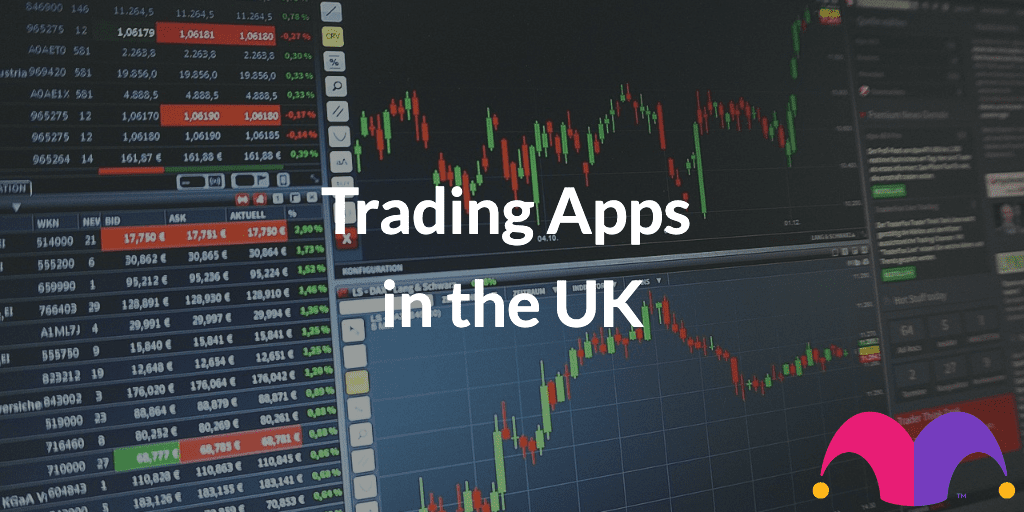Stock trading apps enable investors to follow real-time market updates and invest in stocks easily on their phones. There are many trading apps available, and sometimes it can feel difficult to know where to start.
On this page, we’ll highlight some different options, and help you understand how to choose the right trading app for you.
What to consider when comparing trading apps:
- Commission rates: Many trading apps apply commissions when you use their services. When researching for a suitable trading app, identify whether the app applies commissions and how high they are.
- Your level of expertise: When choosing the right trading app, your level of experience will be extremely relevant. Some trading apps are simple and intuitive to use, while others are more complex and require a level of expertise to use them effectively. If you’re a more experienced trader, you’re likely to need a more advanced app that will offer more information and features such as watch lists, copy trading, trading calculators, fractional shares, market orders, and leverage.
- Account minimums: To use a trading app’s services, users may be required to make a deposit. Different apps require varying minimum deposits, so it’s important to identify and compare these amounts before you commit.
- User friendliness: The usability of trading apps varies widely, and it’s important to choose an app that you find intuitive and enjoyable.If you’re a beginner, apps with simple interfaces in which you can see your accounts and investments at a glance can be helpful.
- Investments offered: When choosing your trading app, explore which types of investments each app offers. Whether you’re interested in shares, bonds, actively managed funds, index tracking funds or investment trusts, you’ll want to choose an app that offers what you’re looking for.
The Motley Fool’s featured trading apps:
Good for long-term, active investors looking for shares and funds
Hargreaves Lansdown Fund and Share Account *
| Trading Commission | £5.95 – £11.95‡ |
| Account Management Fee | From £0.00† |
- Pros & Cons
- Fees & Charges
Pros
- Wide choice of investments and research material
- Good value for active investors
- Clear and functional platform
Cons
- Expensive commissions for infrequent investors
- Limited options for traders
- Complex fee structure
Monthly subscription fee: £0
Equities custody charge: £0
Fund management charge:
On the first £0 to £250,000 = 0.45%,
On the value between £250,000 to £1m = 0.25%,
On the value between £1m and £2m = 0.1%,
On the value over £2m = free
UK shares & ETFs: £11.95 (for 0-9 trades in previous month), £8.95 (for 10-19 trades in previous month), £5.95 (for 20+ trades in previous month)
US shares & ETFs: £11.95 (for 0-9 trades in previous month), £8.95 (for 10-19 trades in previous month), £5.95 (for 20+ trades in previous month)
EU shares & ETFs: £11.95 (for 0-9 trades in previous month), £8.95 (for 10-19 trades in previous month), £5.95 (for 20+ trades in previous month)
Fund trades: £0
Spot + FX fees: 1%
Telephone dealing charge: 1% of trade value (£20 min/£50 max)
Good for active investors who want lots of control and choice
IG Share Dealing Account *
| Trading Commission | £8.00‡ |
| Account Management Fee | £8.00† |
- Pros & Cons
- Fees & Charges
Pros
- Huge choice of investments
- Lots of research, learning, and trading tools
- Good value for active investors
Cons
- Platform can feel quite complex
- Expensive for infrequent investors
- Big emphasis on trading
Platform Fees:†
Monthly subscription fee: £0.00
Equities custody charge: £8.00/month, or £0.00 if you trade more than 3 times per quarter
Fund management charge: N/A
Dealing Fees:‡
UK shares & ETFs: £8.00 if you place 0-2 trades in the previous month, £3.00 if you place 3 or more
US shares & ETFs: £10.00 if you place 0-2 trades in the previous month, £0.00 if you place 3 or more
EU shares & ETFs: 0.1% trade value (€10.00 minimum)
Fund trades: See the Exchange Traded Funds (ETFs) commission rates above. (Units trusts and OEICs are not supported)
Spot + FX fees: 0.5%
Telephone dealing charge: £40.00 for UK shares, £50.00 for US shares
Good for long-term, cost-conscious investors who want lots of flexibility
Interactive Investor Share Dealing Account *
| Trading Commission | From £3.99‡ |
| Account Management Fee | From £4.99† |
- Pros & Cons
- Fees & Charges
Pros
- Low dealing costs
- Flat-rate platform fee structure
- Inclusive free trades with some plans
Cons
- No dealing fee discount for frequent trading
- Some plans can be expensive for smaller portfolios
- Limited trading tools
Interactive Investor offers three different subscription plans – these are easy to switch between at a later date, should circumstances change.
Investor Essentials plan
Platform Fees:†
Monthly subscription fee: £4.99
Equities custody charge: covered by subscription fee
Fund management charge: covered by subscription fee
Note: the ‘Investor Essentials’ plan has a £50,000 investment limit; if this is exceeded the account will automatically be upgraded to the ‘Investor’ plan.
Dealing Fees‡:
UK shares & ETFs: £3.99
US shares: £3.99
Other international shares: £9.99
UK fund trades: £3.99
Investor plan
Platform Fees:†
Monthly subscription fee: £11.99
Equities custody charge: covered by subscription fee
Fund management charge: covered by subscription fee
Dealing Fees‡:
A monthly dealing credit, worth £3.99, is included as part of the account subscription and is valid for 31 days. (Equivalent to 1 free trade per month).
Additional trades are charged as follows:
UK shares & ETFs: £3.99
US shares: £3.99
Other international shares: £9.99
UK fund trades: £3.99
Super Investor plan
Platform Fees:†
Monthly subscription fee: £19.99
Equities custody charge: covered by subscription fee
Fund management charge: covered by subscription fee
Dealing Fees‡:
A monthly dealing credit, worth £7.98, is included as part of the account subscription and is valid for 31 days. (Equivalent to 2 free trades per month).
Additional trades are charged as follows:
UK shares & ETFs: £3.99
US shares: £3.99
Other international shares: £5.99
Fund trades: £3.99
Applicable to all plans
Regular investing service: free to use (£25 minimum investment amount, no dealing fees)
Spot + FX fees: 1.5%
Telephone dealing charge: £49
Note: For UK and US trades over £100,000, and other International share trades over £25,000 additional fees and charges apply. (See the Interactive Investor website for full details.)
Risk Warning
Investments involve various risks, and you may get back less than you put in.
The value of your investments can go down as well as up and you may not get back all the money you put in. All investments carry a varying degree of risk and it’s important you understand the nature of these risks. The Motley Fool believes in building wealth through long-term investing and so we do not promote or encourage high-risk activities including day trading, CFDs, spread betting, cryptocurrencies, and forex. Click here to learn more.
What is a trading app?
A trading app conveniently allows traders and investors to place trades and manage their accounts all from their own phone or tablet. Many trading apps also boast other features, such as news feeds, real-time quotes, and charting tools.
How do stock trading apps work in the UK?
In the past, if you wanted to invest in the stock market you would have to approach a recognised stockbroker. The range of products to invest in was limited and you’d pay a lot of money for the privilege.
Nowadays, there are a variety of trading platform apps that anyone can use, straight from their phone. You’ll find apps that offer an excess of options – bonds, stocks, and funds– often for no fee or a low fee.
It’s important to note that although trading platform apps can offer a variety of options, The Motley Fool does not promote or encourage high-risk activities including day trading, CFDs, spread betting, cryptocurrencies, and forex.
What is the best trading app for beginners?
When you’re new to the world of trading, you’ll want to choose an app with a simple interface, solid customer service, and enough guidance and resources to learn how things work to make the most of your investments. However, you may also seek to use alternative tools for guidance and resources, learning to make the most of your investments.
Beginners will also want to choose an app with low commissions and fees that offer a wide range of stocks and other investments.
What is the best trading app for experienced investors?
For experienced investors, look for an app that has a wide range of trading tools and detailed research. Some apps even offer advanced types of investments, such as options and future contracts, that are more popular with experienced traders.
Fees for stock trading apps
One important factor to bear in mind when comparing trading apps are fees. Even low fees can drastically reduce your portfolio’s return, particularly if you’re a frequent trader. Here are the most common types of trading app fees:
- Trade commissions: You’ll pay these fees when you buy or sell securities, such as stocks, ETFs, or options. In many trading apps, these fees can be very low.
- Management fees: Some trading apps will charge a small fee for the maintenance of your account. Usually this is calculated based on a percentage of your portfolio.
- Transfer fees: Certain brokers charge a fee if you want to transfer your stocks to a different trading app.
- Inactivity fees: Some apps will charge you an “inactivity fee” if you don’t carry out a minimum number of trades within a specific timeframe.
- Platform fees: Brokers often charge a flat monthly or annual fee for using the trading app but some platforms are free.
Advantages of using an investing app to trade stocks
Investing apps can be easier and more convenient than more traditional trading methods. Since they entered the personal finance world, people from all backgrounds are trying their hands at investing.
Here are the advantages of using an investing app to trade stocks:
- Cost-effectiveness: Compared to using a stockbroker, trading stocks through an investment app is inexpensive.
- Convenience: With a trading app, opening an account is easy and hassle-free. With just a device and an internet connection, you can monitor your investments 24/7. You can also carry out trading activities wherever you are, even while travelling.
- All in one place: Most trading apps use just one interface to display all your investments and their performance. You can also buy and sell shares whenever is convenient, all the while keeping an eye on your profits and losses.
- Faster transactions: Buying and selling shares on a trading app is very quick, as are transaction payments and collections. Trading apps offer a variety of payment methods that enable rapid fund transfers.
- Greater control: With a trading app, you have no need for a broker, meaning you can maintain overall control of all your trading activities and decisions.
- Better understanding: Trading apps offer a window into the world of investing. Making all of your decisions alone, and acting on them, will allow you to gain an understanding much more quickly than through a third party.
Disadvantages of using an investing app to trade stocks
Here are some common disadvantages to be aware of with trading apps:
- Risk: Perhaps the biggest disadvantage to trading online is the associated risk. Trading can be highly profitable, but you can lose money quickly if you’re not on top of things.
- Mistakes can happen: Online trading requires high level concentration and caution. Just one mistake may lead to a big loss. Only trade once you have learned the basics about the world of investing and are feeling in control.
Who is a trading app right for?
Trading apps might be right for anyone who would like to participate in short-term trading. Whether you’re an experienced investor, or just dipping your toe in the world of trading, you can most likely find an app that fits your needs.
But, it’s important to remember that the value of your investments can go down as well as up, and you may not get back all the money you put in. All investments carry a varying degree of risk and it’s important you understand the nature of these (including any potential currency related or overseas listed) risks.
That said, if you’re looking for long-term investments or prefer to take a more hands-off approach, you may be better served with a traditional online broker. If that’s you, check out these UK brokerage accounts to help you find a better suited investment platform.
How to choose the best stock trading app for you
As with so many personal finance decisions, there’s no best stocks trading app that is right for everyone. Your decision will largely depend on your personal needs and what you want from the app.
Costs and fees are perhaps the most obvious consideration to bear in mind. But, there are several other factors to think about to get the best trading app experience for you.,these include:
- How user-friendly and intuitive do you find the app?
- What investments are you looking to trade? Shares, funds, or more high-level investments?
- If you’re a beginner, does the app offer the opportunity to practice trading before starting for real?
- Does the app charge other admin fees?
- Does your app have a minimum investment requirement?
- Is the app provider regulated by the Financial Conduct Authority (FCA)?
- Does the app offer any extra rewards/benefits?
- What analytical and research tools does the app provide?
Investment platform alternatives
Continue comparing investing options with any other types of investment platforms:
Frequently Asked Questions
-
A stock trading app allows investors and traders to keep an eye on accounts and place trades through financial intermediaries. Trading apps often have other features, such as charting tools, real-time quotes, and news feeds.
-
There are many UK stock trading apps. To trade safely, make sure the platform provider is authorised and regulated by the Financial Conduct Authority (FCA) – not all of them will be. Also, check the app is owned by a trustworthy source. Finally, check if the app uses encryption for handling data.
-
One important factor to bear in mind when comparing trading apps are fees. Even low fees can drastically reduce your portfolio’s return, particularly if you’re a frequent trader. Some brokers charge a flat monthly or annual fee for using the trading app.
Here are the most common types of trading app fees:
- Trade commissions: You’ll pay these fees when you buy or sell securities, such as stocks, ETFs, or options. In many trading apps, these fees can be very low.
- Management fees: Some trading apps will charge a fee, which is often a small fee, for the maintenance of your account. Usually this is calculated based on a percentage of your portfolio.
- Transfer fees: Some brokers charge a fee if you want to transfer your stocks to a different trading app.
- Inactivity fees: Some apps will charge you an “inactivity fee” if you don’t carry out a minimum number of trades within a specific timeframe.
Why we work with affiliate partners
We partner with the financial companies that are behind some of the products that are listed on The Motley Fool. We appreciate our partners because, by supporting us, they are helping The Motley Fool bring financial information and education to readers like you.
Affiliate partnerships do not affect our reviews. That means that the reviews that you see on the products reflect our view on that product, not our commercial relationship with the partner. Read more about our approach to reviews here.
Look for the * symbol
When you see an ‘*’ on our site, next to a product name, that means that we partner with that company and when you click that link and sign up for a product, we may get paid for that introduction. So, if you find a product from one of our partners that fits your needs, you should feel free to use the link on our site. Not only does that help The Motley Fool (thanks!), but you can feel comfortable because these links take you directly to the issuer’s website where you can securely apply.



